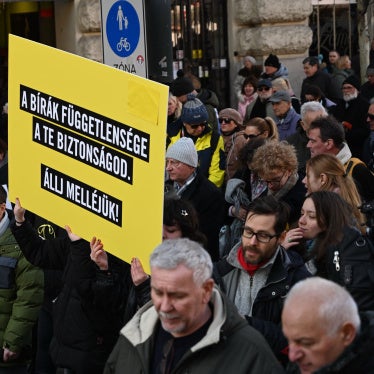Human Rights Watch today welcomed the U.N. Human Rights Committee's new recommendations for improving Georgia's treatment of detainees and prisoners. The Committee cited Georgia's prisons for having a high death rate, poor and unhealthy living conditions, and widespread police torture and arbitrary detention. It gave the Georgian government an extraordinary twelve-month deadline to report back on measures taken to curb these abuses.
The Committee has provided clear instructions on what Georgia must do to fulfil its international human rights obligations," said Elizabeth Andersen, executive director of Human Rights Watch's Europe and Central Asia division. "The government must now move swiftly to reform Georgia's police, prisons, and criminal procedure code."
The United Nations Human Rights Committee, a body of eighteen independent experts, monitors compliance of all countries party to the International Covenant on Civil and Political Rights with the covenant's provisions.
During its review of Georgia, on March 18-19, the Committee also expressed "deep concern" about Georgia's rising intolerance against religious minorities, particularly Jehovah's Witnesses. Mob attacks by Georgian orthodox militants against religious minorities have escalated throughout the past two and a half years, facilitated by government inaction. The Committee called upon the Georgian government to ensure that those perpetrating abuses against religious minorities are prosecuted, to conduct a public awareness campaign on religious tolerance, and prevent, through education, intolerance and discrimination based on religion or beliefs.
The Committee's specific recommendations for curbing torture and cruel, inhuman, or degrading punishment or treatment by law enforcement officials and prison officers were as follows:
·"[E]nsure that all forms of torture and similar ill-treatment are punishable as serious crimes under its legislation";
·"[S]et up an effective system to monitor the treatment of all prisoners" to ensure better protection of their personal safety;
·"[E]nsure that all complaints of ill-treatment are properly investigated by an independent authority, that those responsible are brought to justice and that victims are appropriately compensated";
·"Immediately upon first being deprived of liberty and during all stages of detention, free access to a lawyer and to doctors should be ensured";
·Ensure "[A]ll statements obtained by force from detained persons are investigated and may never be used as evidence, except as evidence of torture";
·"[P]rovide training in human rights particularly on the prohibition of torture, to police and prison officers";
Human Rights Watch has extensively documented widespread torture, mistreatment, and procedural violations by Georgian law enforcement officials in recent years. Methods of torture include sustained beating and the use of electric shocks. New figures from the Georgian Ministry of Justice indicate that police mistreatment and torture have not abated in recent months. In January and February alone, forty-four detainees transferred into pre-trial detention centers from police stations bore fresh injuries. The Georgian parliament's adoption in May and July 1999 of numerous regressive amendments to the 1998 criminal procedure code stripped away human rights protections for detainees, such as the right to file complaints with the courts about abuse or torture during pre-trial detention. Human Rights Watch's concern over these amendments prompted the publication in October 2000 of its report: "Backtracking on Reform: Amendments Undermine Access to Justice."
The Committee expressed particular concern that the criminal procedure code permits detainees to be held by the police for up to seventy-two hours before being informed of the charges against them and a court orders their pre-trial detention. However, Georgian Ministry of Justice figures for 2001 show that, for the Tbilisi pre-trial detention center alone, 493 detainees were brought in from police stations in violation of the seventy-two hour deadline.
BACKGROUND NOTE ON GEORGIA'S CRIMINAL JUSTICE SYSTEM
Georgia's police, procuracy, and system of state provision of defense lawyers remain largely unreformed since the time of the Soviet Union, and elements within these structures are reported to have lobbied parliament to secure the regressive criminal procedure code amendments of mid-1999. Reform of the judiciary has begun with the assistance of a World Bank project, yet several observers have questioned the sustainability of a reformed judiciary without reform of law enforcement institutions. Low and unreliably paid salaries, combined with the broad powers enjoyed by the police and procuracy, create significant incentives for law enforcement officials to abuse their position. An assessment of the state of the rule of law in Georgia prepared in April 2000 for USAID concluded that: "Administration of justice is often conducted by a network of self-interested public officials concerned with neither the defendant nor the victim." In December 2001 President Shevardnadze established a commission to design a program of reform of the law enforcement bodies.







